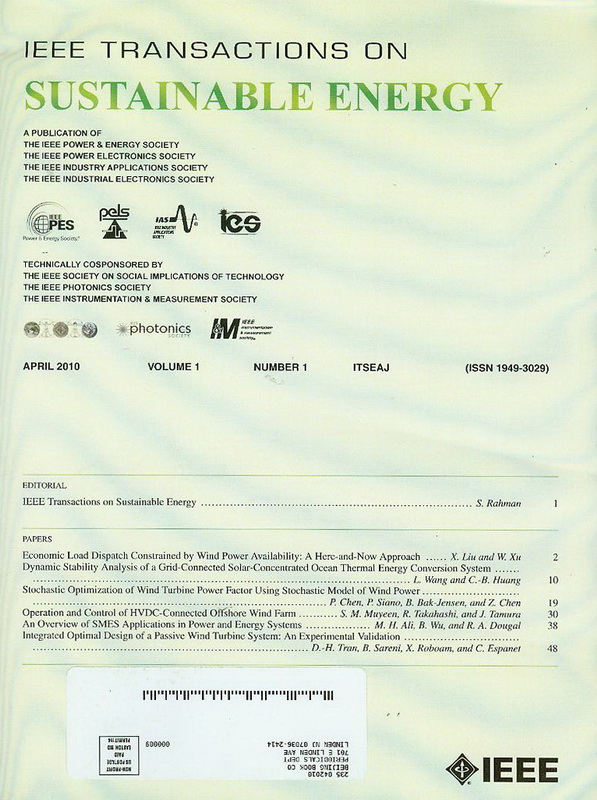基于数据驱动灵敏度的风电场分散需求功率跟踪与电压控制方法
IF 10
1区 工程技术
Q1 ENERGY & FUELS
引用次数: 0
摘要
有效的风电场电力调度取决于精确的需求电力跟踪。本文提出了一种基于数据驱动灵敏度(dds)的分散WF功率跟踪和电压控制方法。该方法仅依赖于局部操作变量进行模型预测控制(MPC),可获得近全局最优解。利用反向传播算法,设计了一种新的灵敏度计算方法,通过计算全局映射模型(GMM)的梯度来产生dds。通过计算电压GMM的梯度,可以简单地推导出电压dds,可以代替传统MPC方法中的电压灵敏度。功率DDSs建立了不同风力机输出功率之间的线性关系,将风力机状态空间方程简化为局部预测模型,降低了二次规划维数。基于dds设计的三种控制模式可以实现无WF线参数控制,降低计算复杂度,或将两者结合起来。变间距约束线性化方法将非线性约束转化为线性约束,解决了控制变量之间的非线性耦合问题。在MATLAB/Simulink中对32台WF进行了测试,证明了该方法与集中控制方法相当的有效性。本文章由计算机程序翻译,如有差异,请以英文原文为准。
A Decentralized Demanded Power Tracking and Voltage Control Method for Wind Farms Based on Data-Driven Sensitivities
Efficient power dispatch in wind farms (WFs) hinges on precise demanded power tracking. This study proposes a decentralized WF power tracking and voltage control method based on data-driven sensitivities (DDSs). This method relies only on local operational variables for model predictive control (MPC), achieving near-global optimal solutions. With a backpropagation algorithm, a new sensitivity calculation method is designed to yield DDSs by computing the gradients of a global mapping model (GMM). The voltage DDSs can be derived simply by calculating the gradient of the voltage GMM and can replace the voltage sensitivities in traditional MPC methods. The power DDSs establishes linear relationships between the power outputs of different wind turbines (WTs), simplifying the WF state-space equations to local prediction models for reducing the quadratic programming dimensions. The three control modes designed based on DDSs enable control without WF line parameters, reduce computational complexity, or combine both effects. The variable spacing constraint linearization method transforms nonlinear constraints into linear ones, addressing the nonlinear coupling between control variables. Testing on a WF with 32 WTs in MATLAB/Simulink demonstrates the effectiveness of the proposed method comparable to centralized control methods.
求助全文
通过发布文献求助,成功后即可免费获取论文全文。
去求助
来源期刊

IEEE Transactions on Sustainable Energy
ENERGY & FUELS-ENGINEERING, ELECTRICAL & ELECTRONIC
CiteScore
21.40
自引率
5.70%
发文量
215
审稿时长
5 months
期刊介绍:
The IEEE Transactions on Sustainable Energy serves as a pivotal platform for sharing groundbreaking research findings on sustainable energy systems, with a focus on their seamless integration into power transmission and/or distribution grids. The journal showcases original research spanning the design, implementation, grid-integration, and control of sustainable energy technologies and systems. Additionally, the Transactions warmly welcomes manuscripts addressing the design, implementation, and evaluation of power systems influenced by sustainable energy systems and devices.
 求助内容:
求助内容: 应助结果提醒方式:
应助结果提醒方式:


